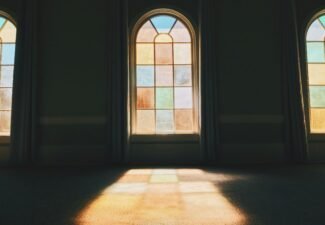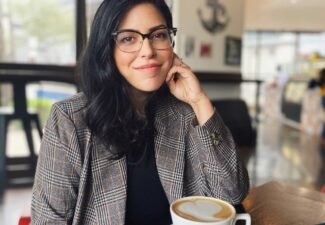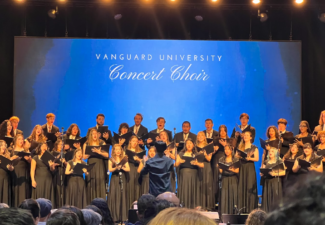Scrolling through her phone, Mina Ahmed, a Muslim student at a Christian high school, saw photos from her sister’s social media page of their family’s annual Eid celebration. Eid al- Fitr is an Islamic tradition celebrating the end of Ramadan where friends and family gather to pray and hold festivities. Meanwhile, Mina was on her way to mass for her Christian theology class. Unable to be absent at the risk of failing the course, Mina had to skip out on her faith’s tra- dition.
At the same time, student Kaitlyn Vasconcelos worked tirelessly, tossing flags and spinning rifles for her secular school’s color guard team. Though she knew the hours of practice would pay off in competition, she couldn’t help but think of her family, sitting in the pews of their home church at that very moment.
To Mina and Kaitlyn, these are distant memories. Mina went on to attend a public institu- tion, and Kaitlyn now attends Vanguard University, where missing out on their faiths is never an issue. Attending a religious institution like VU can give college students a common interest and a sense of community away from home, but in America’s wide range of cultures and religions, are there benefits to being in a religiously diverse learning environment?
“My high school was Catholic, which ironically made me feel more appreciative of my cul-
tural upbringing than before,” Mina says. “People would make a lot of offhand assumptions or comments about [her] culture and Islam,” she states.
Being at a school without religious diversity resulted in many students being ignorant of other faiths. Though not many people identified as Muslim, she found that comparing and contrasting different religions, cultures, and beliefs made her more knowledgeable and have a deeper relationship with her own faith.
Mina says her current school is a melting pot of all different cultures and faiths, so it’s
nice to find student and faculty organizations that emphasize and celebrate the plurality of differ- ent cultures within it.
As someone who didn’t identify with the religion of the high school she attended, she appreciates the diversity found at her new university.
“Now, there are so many different practices taking place that it is much more accessible and attainable to find that group that fits you best,” Mina states. In her case, the ability to experience various cultures and religions fueled her own greater sense of belonging.
On the other hand, Kaitlyn finds that attending a faith-based university gives her a community that she can rely on.
“None of my schools were religiously affiliated, and I feel that it made it harder to have friends to relate to in that way,” Kaitlyn states.
Since religion is such a huge part of her life, Kaitlyn likes to integrate it into her everyday practices. She says that public institutions exposed her to people who would do things that went against her
beliefs whereas being at religiously affiliated school makes it easier to find people who will support me in my beliefs, and even having professors who I can go to ask for prayer and guidance is very helpful.
Vanguard University has become a support system for her because the campus culture aligns with her belief system.
Though their experiences are seemingly polar opposites, both Mina and Kaitlyn have found the places that suit them best and taken valuable lessons along the way. Nonreligious schools helped me learn how to find the right people to surround myself with said Kaitlyn.
Mina echoes this sentiment, saying, “Each experience taught me the importance of solidifying your own values and then finding people who align with those values.”
No matter the affiliation of the school or university, they were able to practice discernment and find people who supported their lifestyles.
Their stories are only two out of millions. Each individual has their own path and can prefer different educational experiences. Religious diversity can expose a student to varieties of cultures and ideologies, whereas religious institutions offer community and a safe space to practice for those within the religion. Neither is better or worse.
It all rides on the individuals personal and spiritual needs being met.

 The Liturgical Calendar: Should Christians Observe It?
The Liturgical Calendar: Should Christians Observe It? Embracing Authenticity in the Pursuit of Success: A Reflection on Journalism, Education, and Meaningful Academia
Embracing Authenticity in the Pursuit of Success: A Reflection on Journalism, Education, and Meaningful Academia Spring Concert: Music From Around the World
Spring Concert: Music From Around the World Recycling on College Campuses
Recycling on College Campuses
Leave a Reply